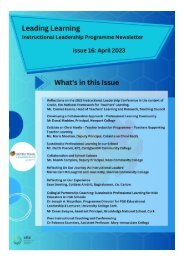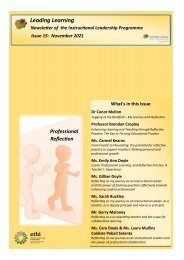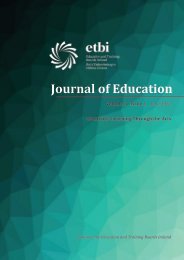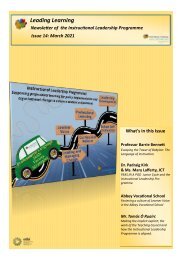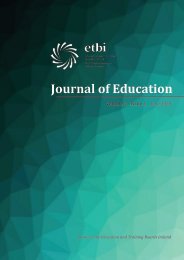ETBI Journal of Education - Vol 2:2 November 2020 (Irish-medium Education)
This bilingual edition of the Journal of Education celebrates Irish-medium Education
This bilingual edition of the Journal of Education celebrates Irish-medium Education
You also want an ePaper? Increase the reach of your titles
YUMPU automatically turns print PDFs into web optimized ePapers that Google loves.
<strong>ETBI</strong> <strong>Journal</strong> <strong>of</strong> <strong>Education</strong> <strong>November</strong> <strong>2020</strong><br />
Immersion <strong>Education</strong> and Language Revitalisation<br />
Pr<strong>of</strong>. Muiris Ó Laoire Institute <strong>of</strong> Technology, Tralee.<br />
This article discusses immersion education in the<br />
context <strong>of</strong> language revitalisation. From the emphasis<br />
placed on language planning in recent years (The<br />
Twenty Year Strategy, Language Planning in the<br />
Gaeltacht and the Policy on Gaeltacht <strong>Education</strong>),<br />
it is clear that the State expects to revitalise and<br />
strengthen the language through the <strong>medium</strong> <strong>of</strong><br />
education. This question is examined here in the<br />
context <strong>of</strong> immersion education.<br />
INTRODUCTION<br />
Immersion education is going from strength to<br />
strength in this country, and in other countries and<br />
regions around the world. There are many reasons<br />
for the demand for immersion education schools,<br />
related to educational achievement, delivery <strong>of</strong><br />
education, resources and so on. But a fundamental<br />
question has been posed for a long time now<br />
regarding the potential function <strong>of</strong> immersion<br />
education in the context <strong>of</strong> language revitalisation.<br />
Is immersion education producing capable, active,<br />
new-age speakers <strong>of</strong> the language to contribute<br />
to language revitalisation? In the case <strong>of</strong> <strong>Irish</strong>, the<br />
question is raised as to how widely <strong>Irish</strong> is used by<br />
immersion education learners after leaving school,<br />
and in the following years? In this article, “new”<br />
immersion education is discussed, along with the<br />
multiple benefits associated with it, and questions<br />
are raised conceptually regarding the challenge <strong>of</strong><br />
language revitalisation.<br />
IS IMMERSION EDUCATION<br />
PRODUCING CAPABLE, ACTIVE,<br />
NEW-AGE SPEAKERS OF THE<br />
LANGUAGE TO CONTRIBUTE TO<br />
LANGUAGE REVITALISATION?<br />
LANGUAGE REVITALISATION<br />
“New” immersion education has been flourishing<br />
around the world for almost twenty years,<br />
particularly in countries and regions where a<br />
minority or native language is threatened by<br />
a dominant language. Immersion education<br />
functions as a strategy for language rennaisance<br />
or revitalisation. These two terms, “revival ”<br />
and “revitalisation”, are used interchangably to<br />
describe the process in which an attempt is made<br />
to bring a language into use again in areas or<br />
domains where it had previously fallen out <strong>of</strong> use 1 .<br />
Although the two terms are in use, there is a<br />
significant difference between them. The term<br />
1 For example, on the topic <strong>of</strong> immersion education and<br />
language revitalisation, Hinton (2001:181) has commented: There<br />
is no doubt that this is the best way to jump-start the production<br />
<strong>of</strong> a new generation <strong>of</strong> fluent speakers for an endangered language.<br />
There is no other system <strong>of</strong> language revitalisation that has such<br />
complete access to so many members <strong>of</strong> the younger generation<br />
(who are the best language learners) for so many hours per day<br />
PAGE 107




